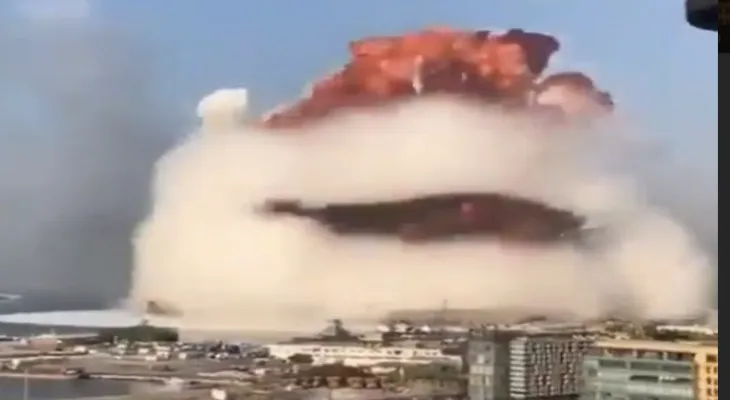Search here
Newspaper
Search here

Arab Canada News
News

Published: August 5, 2020
Agencies: A series of massive explosions shook the Port of Beirut yesterday, Tuesday, killing at least 100 people and injuring about 4,000 others in the capital.
While the cause of the explosion has not been determined yet, initial assessments – according to U.S. intelligence officials and officials in the region who spoke to "Fox News" – indicated that the disaster was accidental. However, some did not rule out further malicious elements related to what was going on in the sensitive port and what was being stored there.
Multiple sources said that most operations in the port were under "unofficial" control of Hezbollah, and there were indications of a fire outbreak in an explosives warehouse inside the facility. Several sources also pointed to organized crime operations inside the port primarily controlled by Hezbollah, and that the explosion may have involved "multiple containers" but was not related to terrorism.
Another intelligence source indicated that "there is a possibility of fireworks, gasoline, and weapons being stored together." He added, "Officially, the explosion occurred in a fireworks and gasoline warehouse." The source also confirmed that based on video analysis of the explosions, small explosions occurred just before the second – largest – explosion. Color variations also indicate the presence of fireworks, but the presence of weapons and other potential materials in the adjacent area was not excluded either.
Ian Bradbury, head of Terra Nova Strategic Management for Defense Consulting based in Canada, pointed out that the heavily damaged port operates as the country's central shipping hub, managed by Gestion et Exploitation du Port de Beyrouth (GEPB), subcontracted to a company called the Beirut Container Terminal Consortium (BCTC). The port is considered one of the largest and busiest ports in the Mediterranean.
He continued, "Importing fireworks is common, and the area seen in the video shows a known site for storing this type of goods." He added, "There is some speculation about shipments of weapons previously received or stored inside this sector of the port, but so far they have not been confirmed."
In addition to the mysterious narrative, Major General Abbas Ibrahim, head of the General Directorate of General Security in Lebanon, said in a television interview, "The container is the source of the initial fire and explosion. The container carried explosive material exports," including sodium nitrate. He pointed out that as a result, "it would be naive to describe such an explosion as due to fireworks."
Nevertheless, the disaster brought Hezbollah back into the spotlight. For months, Lebanon has been considered a growing flashpoint of geopolitical tensions, not only because of the destabilizing activities carried out by the Iran-backed group in the region – from Yemen to Syria to Iraq – but also due to the internal conflict within the small state itself.
Jonathan Schanzer, senior vice president of the Foundation for Defense of Democracies, said, "It currently appears that the explosion in Lebanon was not the result of a military strike." He said, "At present, it seems that this explosion was due to incompetence. But ongoing tensions indicate that future explosions may be the result of something more deliberate. These tensions also come at a particularly bad time for Lebanon."
A new report issued by the Foundation for Defense of Democracies indicates that the financial crisis in Lebanon is so deep that it will require an estimated $93 billion to mitigate its severity.
In the hours preceding the explosion, according to local reports, large numbers of anti-government protesters clashed with security forces outside the Ministry of Energy amid worsening economic problems for citizens.
It is noteworthy that Tuesday’s tragedy occurred just 3 days before the issuance of the International Court’s decision regarding the assassination of former Lebanese Prime Minister Rafik Hariri in 2005, in which 4 Hezbollah members are accused of carrying out the assassination conspiracy.
Comments